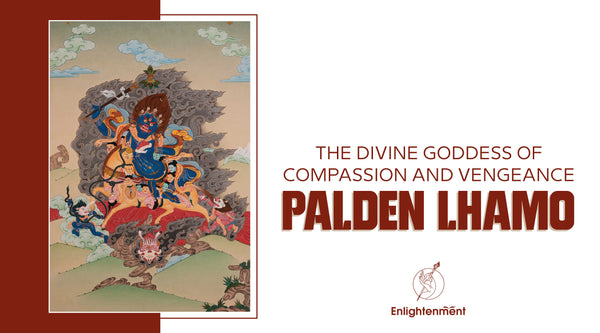The Power Within: Embracing Your Buddha-Nature for a Fulfilling Life
What is Buddha Nature:
Buddha-Nature (Tathagata-garbha, Tathagata-dhātu, and Buddha-dhātu), is an intriguing and profound cornerstone within Mahayana Buddhism. This concept asserts that every sentient being, irrespective of their current state, inherently carries the potential to attain enlightenment and become a Buddha.
The Seed of Enlightenment
Buddha-Nature's core concept centers on the idea that all beings possess the potential to become Buddhas – enlightened individuals embodying perfect wisdom, compassion, and freedom from suffering.
This potential is often likened to a dormant seed, ready to germinate and flourish under the right conditions. It signifies that no one is inherently devoid of the capacity for enlightenment, irrespective of past deeds or current circumstances.
A Universally Embracing Reality
A vital dimension of Buddha-Nature is its universality. It extends beyond a select few and is believed to reside within all sentient beings, regardless of their spiritual progress or karmic history.
This all-encompassing nature underscores the inclusive ethos of Mahayana Buddhism, where the path to enlightenment is accessible to all.
Every Individual Has It
Buddha-Nature is inherent in every individual. The sole distinction between an enlightened being, like a Buddha, and the rest of us lies in their recognition of this nature while we remain unaware.
The essence of Buddhist practice is to unveil our authentic nature, allowing it to radiate. While we may not attain full Buddhahood, we possess the potential to nurture wisdom and compassion and liberate ourselves from selfishness, greed, and hatred.
Buddhist teachings and practices are devoted to discovering our true nature, which is achieved through cultivating the right mindset and behavior and relinquishing detrimental habits that breed dissatisfaction and suffering.
" Every sentient being—even insects—has Buddha nature. The seed of Buddha means consciousness, the cognitive power—the seed of enlightenment. That's from Buddha's viewpoint. All these destructive things can be removed from the mind, so there's no reason to believe some sentient beings cannot become Buddha. So every sentient being has that seed."
- The Dalai Lama
Luminous Nature of Mind
In all Buddhist traditions, it is asserted that the nature of our mind is inherently luminous, signifying that its natural state is one of free, open, and pure awareness.
Buddha-nature refers to this pristine, innate, and radiant condition of our consciousness, unburdened by duality or impurities. The belief is that all beings possess this buddha-nature, which is the foundation for attaining enlightenment.
The numerous Buddhist practices, ranging from serene sitting meditation to deity visualization, chanting, and yogic pursuits, offer diverse methods to dispel temporary obstructions that shroud this nature and reveal the mind's innate perfection.
The Historical Context of Buddha-Nature
Click here to view our Shakyamuni Buddha Thangka
- Origins in Mahayana Buddhism
Buddha-Nature originated within the context of Mahayana Buddhism, which took shape around the 1st century CE and encompasses a diverse array of teachings and traditions.
Mahayana Buddhism is renowned for its emphasis on compassion, altruism, and the pursuit of enlightenment, not just for oneself but for the betterment of all sentient beings.
- Key Texts and Scriptures
The notion of Buddha-Nature finds its primary exposition in various Mahayana sutras, with the Tathāgatagarbha Sutra and the Lankavatara Sutra standing out as among the most prominent.
These texts delve into the essence of Buddha-Nature and its implications for spiritual practice, often employing metaphors and allegories to convey their teachings.
- Debate and Interpretation
Throughout history, the concept of Buddha-nature has ignited substantial debates and interpretations among Buddhist communities. Scholars and practitioners have delved into the intricacies of this concept, giving rise to diverse schools of thought and differing perspectives on the genuine essence of Buddha-Nature.
Interpretations of Buddha-Nature
Two Main Interpretations
The understanding of Buddha-Nature can be broadly categorized into two main interpretations:
- The Potential Interpretation
The Potential Interpretation emphasizes that Buddha-Nature signifies the inherent potential for enlightenment existing within all beings. It perceives Buddha-Nature as the seed of Buddhahood that can be nurtured and cultivated through spiritual practice, ultimately leading to the realization of one's authentic nature.
- The Intrinsic Interpretation
The Intrinsic Interpretation, conversely, posits that Buddha-Nature is not something requiring cultivation or development; instead, it is an inherent and unchanging facet of one's being. According to this perspective, it resembles a luminous and unclouded nature temporarily concealed by ignorance and defilements.
Variations within Interpretations
Within these primary interpretations, subtle variations and nuances come to light. Some scholars and practitioners underscore the significance of effort and practice in realizing Buddha-Nature, whereas others emphasize the effortless and unconditioned nature of enlightenment.
Significance of Buddha-Nature in Buddhist Practice and Philosophy
Click here to view our Shakyamuni Buddha Statue
- Motivation for Practice
A fundamental implication of Buddha-Nature lies in its motivational influence. Recognizing one's inherent potential for enlightenment can act as a potent driver for spiritual practice, instilling hope, determination, and a clear sense of purpose on the journey toward awakening.
- Compassion and Altruism
Furthermore, Buddha-Nature highlights the significance of compassion and altruism within Mahayana Buddhism.
When all beings possess the potential to attain Buddhahood, it becomes the ethical duty of practitioners to labor for the welfare and liberation of all sentient beings, extending their compassion beyond self-interest.
- Transcending Limiting Beliefs
The concept of Buddha nature challenges restrictive beliefs and self-worth judgments.
It serves as a reminder that an individual's genuine essence is not determined by their imperfections or past errors but by the potential for enlightenment within them. This realization can be a profound source of motivation and self-acceptance.
Qualities of Buddha Nature
- The first assertion is that 'Buddha-nature transcends all notions of purity and impurity, embodying ultimate purity.'
- The second assertion states that 'Buddha-nature surpasses all concepts of self and non-self, representing the supreme self.'
- The third assertion emphasizes that 'Buddha-nature encompasses profound bliss, embracing both pleasure and pain, suffering and happiness.'
- Finally, the fourth assertion declares that 'Buddha-nature exists as an enduring state beyond all ideas of permanence and impermanence.'
Implications of Buddha-Nature for One's Spiritual Journey
- A Transformative Perspective
Buddha-nature presents a transformative view of the spiritual journey, encouraging individuals to perceive themselves and others differently, acknowledging the innate potential for enlightenment in all beings. This shift in perspective can bring about profound alterations in one's attitude and life approach.
- A Well of Hope and Strength
During times of adversity and trials, the awareness of Buddha-Nature can be a wellspring of hope and resilience. Realizing that the potential for enlightenment is constant can aid individuals in facing life's challenges with increased composure and determination.
- The Quest for Self-Realization
In essence, the concept of Buddha-nature beckons individuals to embark on a journey of self-realization. It calls upon them to delve into their inner selves, confront their illusions and attachments, and reveal the radiant nature concealed beneath the surface.
Within the intricate tapestry of Mahayana Buddhism, the concept of Buddha-nature emerges as a profound and uplifting thread. It serves as a reminder that enlightenment is not an exclusive privilege for a chosen few but a birthright shared by all sentient beings.
The inherent potential for awakening encapsulated within the notion of Buddha-Nature acts as a guiding beacon on the path to liberation and self-realization.
Whether one aligns with the Potential or Intrinsic interpretation, the essence of Buddha-nature calls upon us to plumb the depths of our being and embark on a journey of profound transformation. It is a reminder that akin to a lotus rising from the mud, we too can blossom into beings of wisdom and compassion, embracing our genuine nature as Buddhas.


